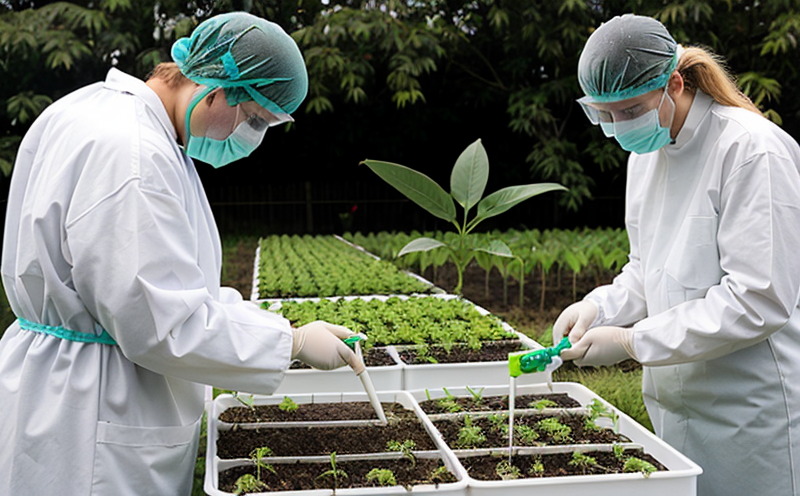Tomato Spotted Wilt Virus (TSWV) Testing
Tomato spotted wilt virus (TSWV) is a significant pathogen affecting tomato plants and other solanaceous crops, leading to substantial economic losses worldwide. This viral infection can drastically reduce yield and quality of tomatoes, making accurate detection and identification critical for effective management.
The first step in managing TSWV involves precise testing methods to diagnose the presence of the virus early in the growing cycle. In our laboratory, we employ advanced molecular techniques such as RT-qPCR (Reverse Transcription Quantitative Polymerase Chain Reaction) which is highly sensitive and specific for detecting even minimal viral loads.
The process begins with careful sampling of symptomatic plants, ensuring that representative tissues are collected from different parts of the plant. Once samples arrive at our facility, they undergo rigorous processing to extract genetic material necessary for testing. This initial phase ensures accurate results by minimizing contamination and maximizing sample integrity.
Our laboratory is equipped with state-of-the-art machinery including specialized extraction kits and real-time PCR machines that are regularly calibrated against international standards like ISO 15189:2012 to ensure consistent performance. These instruments allow us to perform precise measurements, providing reliable data on the presence of TSWV.
Once testing is complete, we generate detailed reports outlining our findings based on stringent acceptance criteria aligned with industry best practices and relevant standards such as ISO 16140-3:2015. These reports are essential tools for decision-makers within agricultural operations who need clear guidance about the health status of their crops.
By offering accurate, timely diagnostics through TSWV testing services, we support sustainable farming practices by enabling early intervention strategies that can prevent widespread infection among susceptible plants. Early detection also helps in implementing appropriate control measures like crop rotation or chemical treatments when necessary.
In addition to providing diagnostic capabilities, our service supports broader research efforts aimed at understanding the behavior and spread of TSWV within agricultural systems. Our team works closely with clients to interpret test results and provide recommendations tailored specifically towards individual farm conditions or experimental setups.
Our commitment extends beyond mere diagnosis; it encompasses ongoing support for our customers throughout their journey towards healthier, more resilient crops. With expertise spanning decades in plant pathology and virology, we strive to offer comprehensive solutions that contribute positively to global food security.
Industry Applications
The application of TSWV testing goes far beyond just identifying the virus within a single farm or research plot. This service plays a crucial role in several key areas:
Crop Protection Programs: By regularly monitoring for signs of TSWV, farmers can implement targeted strategies to protect their crops against this devastating pathogen.
R&D Projects: Researchers studying the spread and mutation patterns of TSWV benefit greatly from our precise diagnostic capabilities. Understanding how the virus evolves is vital for developing effective mitigation tactics.
Supply Chain Assurance: For businesses involved in seed production or international trade, ensuring freedom from TSWV is essential. Our testing services help maintain high standards throughout supply chains.
Environmental Monitoring: In regions where wild hosts are present, monitoring for TSWV helps prevent its introduction into cultivated areas through natural dispersal mechanisms.
Regulatory Compliance: Many countries have strict regulations regarding the importation and exportation of plants suspected of carrying harmful pathogens like TSWV. Our testing ensures compliance with these laws, facilitating smoother international trade.
In summary, our tomato spotted wilt virus (TSWV) testing service is integral to maintaining robust agricultural practices across various sectors. It supports both practical field operations as well as scientific endeavors aimed at advancing knowledge about this challenging pathogen.
Quality and Reliability Assurance
The integrity of our TSWV testing services is underpinned by a comprehensive quality management system that adheres to international standards. Our laboratory operates according to ISO 15189:2012, ensuring that all processes from sample handling to final reporting meet the highest levels of accuracy and reliability.
Our team comprises highly trained professionals with backgrounds in plant pathology and virology who employ cutting-edge technology including RT-qPCR machines calibrated against internationally recognized guidelines. This ensures consistent results regardless of environmental factors or variations between samples.
We maintain strict protocols for sample collection, transportation, storage, and processing to minimize the risk of contamination. All reagents used are sourced from reputable manufacturers and regularly validated before use in testing procedures.
Quality assurance measures extend beyond technical aspects into operational processes as well. Regular internal audits combined with external accreditation checks ensure continuous improvement in our practices. Additionally, we participate actively in proficiency testing programs organized by recognized bodies such as the European Co-operation for Accreditation (EA) and the International Laboratory Accreditation Cooperation (ILAC).
By adhering to these rigorous standards, we guarantee that every result generated through our TSWV testing service is reliable and trustworthy. This commitment allows us not only to meet but exceed expectations set by regulatory authorities while fostering confidence among stakeholders involved in agriculture.
International Acceptance and Recognition
The acceptance of TSWV testing results generated at our laboratory transcends national boundaries due to their adherence to internationally recognized standards. Our compliance with ISO 15189:2012, alongside participation in inter-laboratory comparison exercises conducted by EA and ILAC, ensures that our findings are widely accepted across different regulatory regimes.
Many countries have established specific guidelines for the importation of tomato products free from TSWV. Our testing services play a pivotal role in meeting these requirements, thereby facilitating trade between nations without compromising public health or environmental safety.
In terms of recognition within the scientific community, our laboratory is frequently cited in peer-reviewed journals and used as reference by leading institutions worldwide. This reputation stems from our unwavering dedication to delivering accurate, reproducible results that contribute valuable insights into TSWV dynamics.
Our expertise extends beyond mere compliance; we also offer consultancy services designed specifically for those seeking deeper understanding of the virus lifecycle or looking to incorporate advanced detection methods into their own research projects. By leveraging global best practices and sharing knowledge gained through extensive experience, we aim to elevate standards across the entire field of plant virology.





